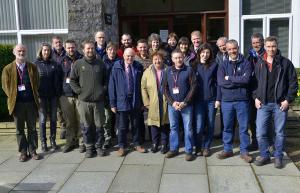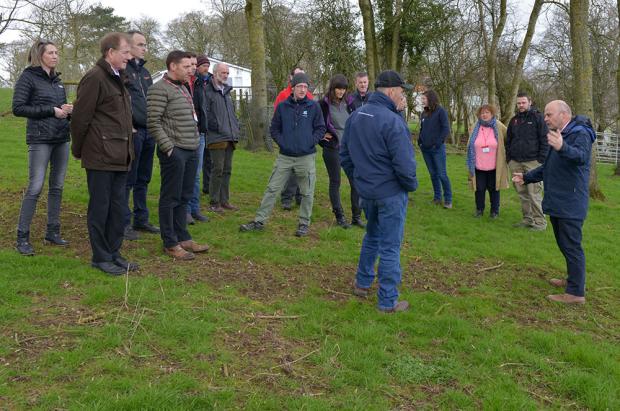AFBI Host National Trust Land Management Forum
Date published:
The Agri Food and Biosciences Institute (AFBI) hosted a recent National Trust Land Management Forum meeting at Loughgall.

The National Trust team included Ian McCurley, Consultancy Manager and Forestry Adviser, Phil Davidson, Regional Wildlife and Countryside Adviser and countryside management team responsible for managing the 12,000 hectares of National Trust land in Northern Ireland. Professor Jim McAdam, Head of Grassland and Plant Science Branch welcomed the group and highlighted AFBI’s plant science research relevant to the Trust.
David Johnston led a tour of the extensive grass breeding programme at Loughgall which aims to produce improved forage grasses well adapted to climatic conditions in the UK and Ireland. The programme, initially established with indigenous Irish material, focuses on breeding disease- resistant, productive varieties which are suited to grazing and silage production. Recent work has studied the use of species rich swards with the objective of identifying nutrient efficient grasses. An increasingly important aspect of the research is the development of legumes which can provide an alternative source of nitrogen and all new varieties developed in the programme are commercialised through an industry partner.

Mel Flexen highlighted the AFBI biodiversity monitoring programme and research into the development of options for DAERA agri-environment schemes. The National Trust land management team were interested to hear about how the outcomes of this work have led to improvements to scheme management prescriptions and options, as much of their farmland is managed under such schemes. Mel then provided a summary of the research and monitoring that AFBI have carried out in relation to sustainable upland management, through projects at CAFRE Greenmount Hill Farm and other upland farms throughout Northern Ireland. The work at Glenwherry was of particular relevance as it demonstrated how organisations and landowners can work in partnership to bring about positive outcomes for both livestock farming, habitats and wildlife.
Linda Walsh reviewed the contribution AFBI research has made to the development and testing of short rotation coppice willow for the sustainable production of agricultural biomass in N.Ireland. AFBI is working with a number of private and public bodies in developing the use of SRC willow for the sustainable management of societal waste water streams; the management of waste, protection of the environment and the production of a renewable energy resource. Recent EU funding success is also enabling AFBI to develop and assess SRC willow options to protect environmental water quality from the negative polluting effects of diffuse agricultural runoff, an intervention which could play a vital role within DAERA’s Sustainable Agricultural Land Management Strategy. The National Trust has been a key adopter of renewable technologies and displaced a considerable proportion of fossil fuel use with alternative renewable energies such as biomass heating.
Dr John Bailey explained that research within Agri-Environment Branch was aimed at delivering significant improvements in the management of three key inter-related natural resources: soil, water and air. He made clear that the ultimate goal was to provide practical solutions to the conundrum of achieving required levels of production - but achieving it in economically and environmentally sustainable ways. Members of the Trust were particularly interested in this as they are seeking to make best use of agricultural land within their management portfolios. They questioned Dr Bailey about the value of soil testing, whether or not soil test data was publically available, and the potential for well managed grassland systems to deliver services including soil C sequestration and improved water quality. They were also interested in the potential for LiDAR and other forms of remote sensing to improve environmental quality.
Overall, the visit proved to be of great interest to the National Trust who expressed appreciation for AFBI’s wide ranging scientific expertise relevant to sustainable farming systems.
Notes to editors:
AFBI carries out high quality technology research and development, statutory, analytical, and diagnostic testing functions for DAERA and other Government departments, public bodies and commercial companies.AFBI's Vision is to use scientific excellence to advance the local and global agri-food sector.All media enquiries to AFBI Press Office